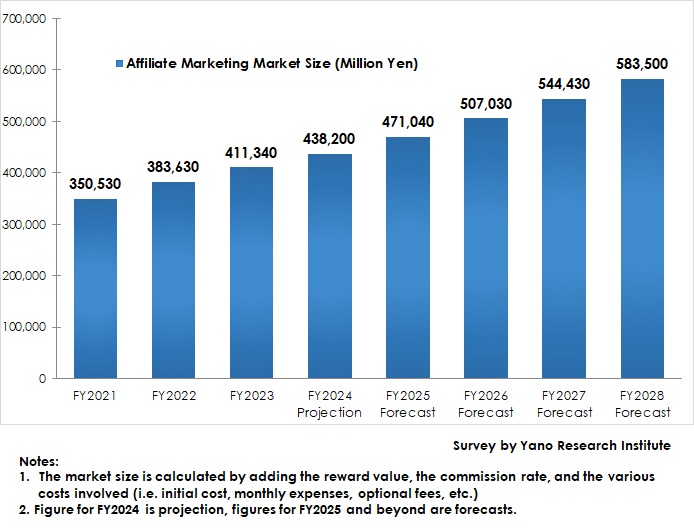No.3746
Affiliate Marketing Market in Japan: Key Research Findings 2025
Affiliate Marketing Market in Japan Projected to rise by 6.5% YoY to 438,200 Million Yen in FY2024
Yano Research Institute (the President, Takashi Mizukoshi) surveyed the domestic affiliate marketing market and found out the market conditions and trends of affiliate service providers (ASPs).

Market Overview
The size of the affiliate marketing market in Japan reached 411,340 million yen in FY2023, 107.2% of the size of the previous fiscal year, with the growth rate slowing down from the previous fiscal year, due to reduced budgets of some advertisers in the credit card and credit card loan sectors, as well as decelerated growth in the ecommerce sector, which peaked during the pandemic.
The slowdown in growth continues in both the financial and ecommerce sectors. On the other hand, the revision of online medical care laws triggered by the pandemic crisis has expanded the demand for affiliate marketing in the online clinic sector. Since 2023, stealth marketing has been regulated, imposing suspension of business and fines for violations, which is expected to reduce the sales of some affiliate marketers or some emerging service providers to experience a shakeout.
Because of the above, the domestic affiliate marketing market is projected to reach 438,200 million yen, 106.5% of the size of the previous fiscal year.
Noteworthy Topics
Stricter Regulations against Fraudulent Behaviors Have Made the Entire Industry Be Healthier
Stealth marketing regulations have been enacted since October 2023. This is to regulate media and affiliates for their fraudulent behavior of promoting products and services without presenting it as advertising.
By 2024, many unscrupulous business operators who had increased sales by engaging in fraudulent behavior were punished by being suspended or fined. As a result, the entire affiliate marketing market is expected to be healthier. There has been a social problem of celebrity impersonation on YouTube and other social media platforms, which are causing investment scams and romance scams. Therefore, regulations on social media platforms have been tightened.
Some other laws and regulations are planned to be enforced on affiliate marketing after 2025, which is expected to eliminate malicious business operators who repeatedly conduct scams from the market.
Future Outlook
The domestic affiliate marketing market is still on a growing trend, but the growth rate is forecast to be slower than in the past.
The growth factors are new entrants, such as new advertisers who newly use affiliate marketing, or entrants from new genres such as online clinics, increasing participation of young affiliate marketers, and the emergence of new ecommerce platforms.
Coupled with the higher rate of ecommerce usage, the demand for affiliate marketing in mall type businesses has been growing in recent years. As the affiliate marketing market becomes healthier due to stricter regulations on fraudulent advertising, it is possible that the advertising budget on social media platforms, where fraudulent behavior is common, will flow into affiliate marketing.
Because of the above factors, the CAGR of the affiliate marketing market from FY2023 to FY2028 is expected to be 7.2%, with the domestic affiliate marketing market size reaching 583,500 million yen in FY2028.
Research Outline
2.Research Object: Affiliate marketers, industrial groups, etc.
3.Research Methogology: Face-to-face interviews (including online) by expert researchers, questionnaire survey, and literature research
The Affiliate Marketing Market
Affiliate marketing is a type of performance-based marketing where a product manufacturer or a seller (an advertiser) who wants to sell its product places a link of its own company website at some other websites and media such as blogs and social media, and pays a certain amount of rewards to the owners of the media (websites, blogs, and social media) when the promotions led to a successful result i.e. purchasing of the product, membership registrations, etc. through that link.
Also known as a publisher, the affiliate can be either an individual or a company that markets the seller’s product in an appealing way to potential consumers.
Affiliate marketing in this research refers to the following four types: 1) ASP (Affiliate marketing Service Provider) style, where an ASP acts as an agent to go between an advertiser and website owners. An ASP earns advertisement and commission fees from an advertiser, while it pays rewards to website owners; 2) Shopping mall style, where a virtual shopping mall earns advertisement and commission fees from shop owners for offering a place to promote sales of products to deal in, and pays rewards to website owners; 3) Stand-alone type, where an ecommerce owner itself becomes an advertiser to promote its own products and contents, and pays the website owners for rewards, and 4) Platform type that earns rewards by offering a platform equipped with tracking systems and analysis tools needed for affiliate marketing.
The size of the affiliate marketing market has been calculated by totaling the reward value, commission rate, and various charges involved (i.e. initial cost, monthly expenses, optional charges, etc.)
<Products and Services in the Market>
Affiliate marketing programs, various affiliate services
Published Report
Contact Us
The copyright and all other rights pertaining to this report belong to Yano Research Institute.
Please contact our PR team when quoting the report contents for the purpose other than media coverage.
Depending on the purpose of using our report, we may ask you to present your sentences for confirmation beforehand.